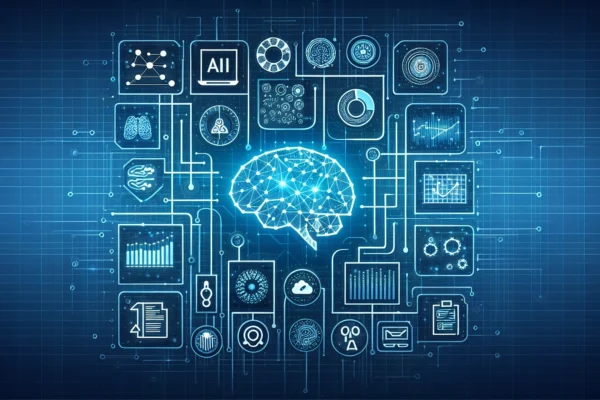AI Revolutionizing Personalized Medicine: A New Era of Healthcare
Personalized medicine, the tailoring of medical treatment to the individual characteristics of each patient, is no longer a futuristic concept. Thanks to the rapid advancements in Artificial Intelligence (AI), it’s becoming a tangible reality, promising to transform healthcare as we know it. AI’s ability to analyze vast datasets, identify patterns, and predict outcomes with unprecedented accuracy is ushering in a new era of precision and effectiveness, moving away from the one-size-fits-all approach to treatment.
Unlocking the Power of Genomics with AI:
Genomics, the study of an organism’s entire genetic material, holds the key to understanding individual predispositions to diseases and responses to therapies. However, the sheer volume of genomic data is overwhelming. This is where AI shines.
- Accelerated Genome Sequencing & Analysis: AI algorithms can drastically speed up the process of analyzing sequenced genomes, identifying genetic mutations, and pinpointing potential disease-causing variants. Machine learning models can learn to recognize patterns in the genome that are associated with specific conditions, significantly reducing the time and cost of genomic analysis. Companies like Deep Genomics are leveraging AI to identify novel drug targets by analyzing the human genome and predicting how different mutations will affect gene expression and protein function.
- Predictive Risk Assessment: AI can analyze an individual’s genomic profile, lifestyle factors, and family history to assess their risk of developing specific diseases, such as cancer, heart disease, and Alzheimer’s. This allows for proactive interventions, such as lifestyle changes, preventative medications, or earlier screening programs, ultimately leading to improved health outcomes. For example, AI algorithms can analyze mammograms alongside genomic data to more accurately predict a woman’s risk of breast cancer, enabling personalized screening schedules.
- Pharmacogenomics & Drug Response Prediction: Pharmacogenomics studies how genes affect a person’s response to drugs. AI algorithms can analyze a patient’s genetic makeup to predict how they will respond to different medications, helping doctors to choose the most effective treatment and avoid adverse drug reactions. This is particularly important for conditions like cancer and cardiovascular disease, where treatment options are often complex and carry significant side effects. AI can help personalize drug selection and dosage based on individual genetic profiles, maximizing therapeutic benefits and minimizing harm.
AI-Powered Diagnostics: Earlier, Faster, and More Accurate:
Early and accurate diagnosis is crucial for effective treatment and improved patient outcomes. AI is revolutionizing diagnostics across various medical specialties.
- Medical Imaging Analysis: AI algorithms can analyze medical images, such as X-rays, CT scans, and MRIs, with remarkable speed and accuracy. Deep learning models can be trained to detect subtle anomalies that might be missed by human radiologists, leading to earlier diagnosis of diseases like cancer, pneumonia, and stroke. Companies like Arterys are using AI to analyze cardiac MRI images, providing clinicians with detailed information about heart function and structure, enabling more precise diagnosis and treatment of cardiovascular diseases.
- Pathology & Histopathology: AI is transforming the field of pathology by automating the analysis of tissue samples and identifying cancerous cells with high precision. AI algorithms can analyze digital pathology slides to detect patterns and features that are indicative of cancer, helping pathologists to make more accurate and timely diagnoses. This is particularly beneficial in situations where pathologists are facing heavy workloads or when dealing with rare or complex cancer types.
- Wearable Sensor Data Analysis: Wearable sensors, such as smartwatches and fitness trackers, generate vast amounts of physiological data, including heart rate, sleep patterns, and activity levels. AI algorithms can analyze this data to detect subtle changes that may indicate the onset of a disease or the progression of an existing condition. For example, AI can analyze heart rate variability data to detect early signs of atrial fibrillation or predict the risk of heart failure exacerbation.
AI in Drug Discovery & Development: Accelerating Innovation:
The traditional drug discovery process is lengthy, expensive, and often unsuccessful. AI is accelerating and improving this process in several ways.
- Target Identification & Validation: AI can analyze vast datasets of genomic, proteomic, and clinical data to identify promising drug targets and validate their relevance to disease. This can significantly reduce the time and cost of drug discovery by focusing research efforts on the most promising targets. AI algorithms can predict the effects of different drug candidates on specific targets, helping researchers to prioritize compounds for further development.
- Drug Repurposing: AI can identify existing drugs that may be effective against new diseases. By analyzing drug-target interactions and disease pathways, AI can predict which drugs might be repurposed for new indications, accelerating the development of new treatments for unmet medical needs. This approach can significantly reduce the time and cost of drug development compared to developing new drugs from scratch.
- Clinical Trial Optimization: AI can optimize the design and execution of clinical trials, improving the efficiency and success rates of drug development. AI algorithms can identify suitable patient populations for clinical trials, predict patient responses to different treatments, and optimize trial protocols to minimize costs and maximize the chances of success. This can lead to faster and more efficient development of new drugs.
AI-Driven Personalized Treatment Plans:
AI is enabling the development of personalized treatment plans that are tailored to the individual characteristics of each patient.
- Personalized Cancer Therapy: AI is playing a crucial role in personalizing cancer therapy by analyzing genomic data, tumor characteristics, and patient history to predict treatment response and optimize drug selection. AI algorithms can help oncologists to choose the most effective chemotherapy regimens, targeted therapies, and immunotherapies for each patient, maximizing the chances of a positive outcome and minimizing side effects.
- Chronic Disease Management: AI is being used to develop personalized management plans for chronic diseases such as diabetes, heart disease, and asthma. AI algorithms can analyze patient data, including blood glucose levels, blood pressure readings, and medication adherence, to provide personalized recommendations for lifestyle changes, medication adjustments, and monitoring schedules. This can help patients to better manage their conditions and prevent complications.
- Mental Health Treatment: AI is being used to personalize mental health treatment by analyzing patient data, such as symptoms, therapy records, and social media activity, to identify the most effective treatment approaches. AI algorithms can help therapists to tailor their interventions to the specific needs of each patient, improving treatment outcomes and reducing the risk of relapse.
Challenges and Ethical Considerations:
While AI holds immense promise for personalized medicine, there are also challenges and ethical considerations that need to be addressed.
- Data Privacy & Security: Protecting patient data privacy and security is paramount. Robust security measures and data governance frameworks are essential to ensure that patient data is used responsibly and ethically.
- Algorithmic Bias: AI algorithms can be biased if they are trained on biased data. It is crucial to ensure that AI algorithms are trained on diverse and representative datasets to avoid perpetuating existing health disparities.
- Explainability & Transparency: AI algorithms can be complex and difficult to understand. It is important to develop AI algorithms that are explainable and transparent, so that clinicians and patients can understand how the algorithms are making decisions.
- Regulation & Oversight: Clear regulatory frameworks are needed to ensure the safe and effective use of AI in personalized medicine. These frameworks should address issues such as data privacy, algorithmic bias, and clinical validation.
AI is revolutionizing personalized medicine, offering the potential to transform healthcare and improve patient outcomes. While challenges remain, the progress being made is undeniable. As AI technology continues to advance and mature, it will play an increasingly important role in shaping the future of healthcare, leading to a more personalized, precise, and effective approach to medical treatment.


